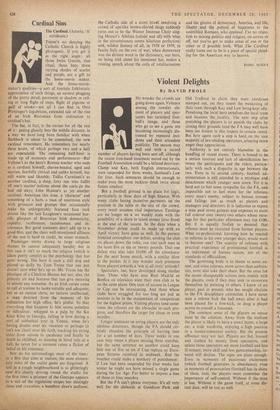Violent Delights
By DAVID PROLE But a football ground is no place for logic, particularly in these days of high finance. With many clubs basing incentive payments on the position in the table or the size of the crowd, every result assumes vital importance. Earnings are no longer on a set weekly scale with the possibility of a share in talent money (also fixed) at the end of the season. So the days when a November defeat could be made up with an April victory have gone as well. In the present frenzied atmosphere one defeat, sending the club six places down the table, can cost each man in the team five or ten or twenty pounds. That one defeat may also take 10,000 off the attendance for the next home match, with a similar blow to the pocket. Is it any wonder such pressures force players towards a 'win at all costs' attitude?
Spectators, too, have developed along similar lines. Those who have seen Real Madrid or Benfica on television want their own club to be on the same plane. One taste of success in League or Cup can be intoxicating. And those whose clubs have struggled for too long are just as, anxious to be in the mainstream of competition for the highest prizes. Visiting players (and some- times the referee), are the obstacles to such pro- gress, and therefore the target for abuse or even missiles.
Longer sentences on erring players are the only obvious deterrents, though the FA should cer- tainly abandon the principle of barring men for a set number of days. Three weeks in one case may mean a player missing three matches,. but the same sentence on another could keep him out of five or six if Cup replays or Euro- pean fixtures occurred in midweek. And the weather could make a mockery of punishment: if Law had been suspended for four weeks last winter he might not have missed a single game during the Ice Age. Far better to impose a .ban of three or four matches.
But the FA can't please everyone. It's all very well for the diehards at Goodison Park and
Old Trafford to claim they want rowdyism stamped out, yet they resent the weakening of their team through Kay and Law being kept idle. Penalising the local hero penalises the local team and incenses the locality. The next step after punishing the players is to punish the clubs by closing their grounds (and the FA may well have been too lenient in this respect in certain cases). But here again such a step is hardfon the vast majority of law-abiding spectators,,arousing more anger than appreciation.
Authority is not entirely blameless in the handling of recent events. There is bound to be a certain mistrust and lack of identification be- tween the participants and the rulers, particu- larly with such a disparity in age between the two. Even in its second century, football ad- ministration is still attended by a mystique and detachment which younger men scorn. Yet it is hard not to feel some sympathy for the FA, and impossible not to feel more for the referees, every man's enemy, subject to human stresses and failings just as much as players and managers and directors. It is ludicrous to expect a man paid seven guineas and expenses to exert full control over twenty-two others whose earn- ings for that particular afternoon may top £100.. But it is equally foolish to demand that referees must be recruited from former players.. What ex-professional, knowing how he reacted to referees in his own younger days, would want to become one? The scarcity of referees with practical experience of professional football is an indictment of human nature, not of the standards of officialdom.
The governing body is to blame to some ex- tent, and some referees, more actors than autho'ri- ties, must also take their share. But the onus for the recent disreputable actions rests mainly with the players, even if they may seek to exonerate themselves by pointing to others. I know of no player, past or present, who has sought election to the FA disciplinary committee. I have never seen a referee kick the ball away after it had been placed for a free-kick, or drag a player across to consult a linesman.
The common sense of the players en masse must be the solution. Away from the stadium the player is likely to have a smart home, a large car, a wide wardrobe, enjoying a high position in a money-conscious society. But the present affluence may not last. Players are fed, housed and clothed by money from spectators, and unless those spectators see more football and less ill-temper, more. skill and less gamesmanship, in- terest will decline. The signs are plain enough. Even in moments of passionate excitement (which football generates in abundance), even in moments of provocation (football has its share of these, too), the players must remember the importance of self-control. Without it the man is lost. Without it the game itself, at some dis- tant date, will be lost as well.






























 Previous page
Previous page